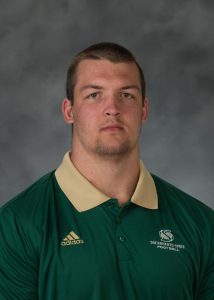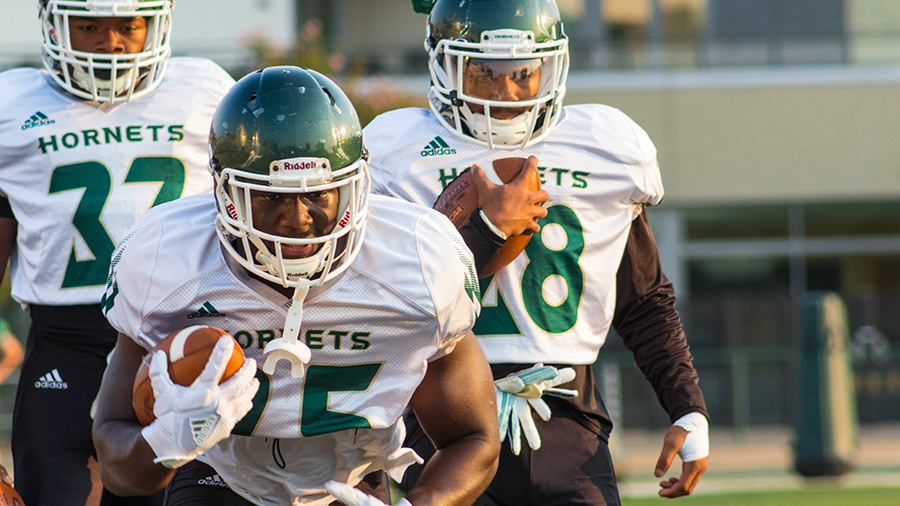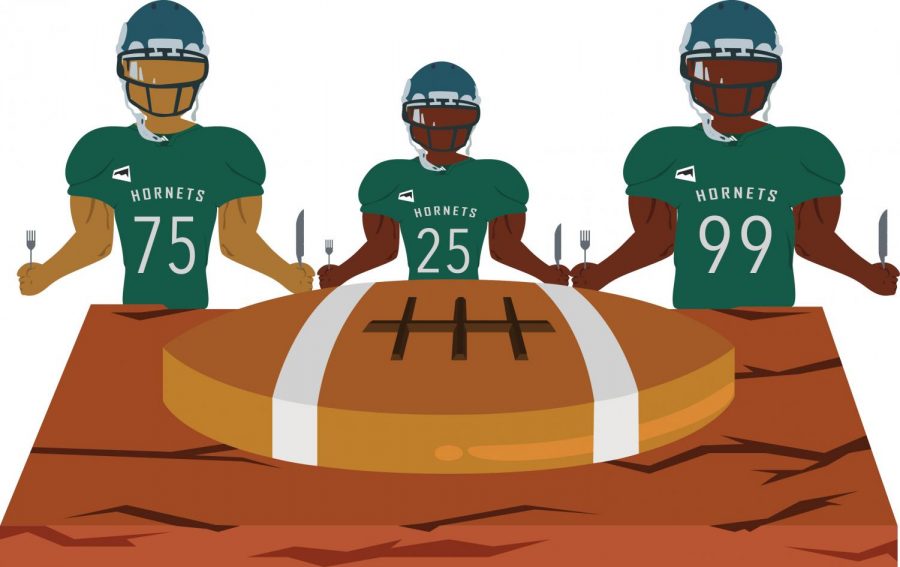Food and football: the hunger to win at Sac State
November 14, 2017
(Go to StateHornet.com/TheFoodIssue for more food-related stories)
Imagine being 6-foot-5, weighing 220 pounds and still considered undersized — that was life for Sacramento State senior Jonathan Bade when he was asked to make the switch from tight end to offensive line.
Bade, who now weighs 280 pounds, was asked to make the switch to tackle in 2015, and he said putting on 60 pounds to play on the offensive line for the Hornets football team wasn’t as easy as it sounds.
“Over the offseason, I just ate and stayed consistent with my diet and lifted often,” Bade said. “I got up to 300 pounds before camp, and then I dropped a little bit to 285 before the season.”

Sacramento State senior Jonathan Bade, who stands at 6-foot-5 and weighs 220 pounds, made the switch from tight end to offensive lineman for the Hornets football team in 2015.
Bade, 23, said his day starts with two cups of rice and about six or seven eggs, noting the importance of carbs and protein in his nutrition in order to maintain his staggering frame.
“I try to have a plan going into each day,” Bade said, referring to his strategy of sticking to three large meals a day. “I just try and be consistent each day, that’s probably the hardest thing.”
Foods that are easy to eat — such as macaroni and cheese and rice — are among Bade’s favorites, however, it might take more convincing to get him to eat his veggies.
“I don’t really like asparagus,” Bade said. “Greens are really hard for me to eat, but I eat them anyways.”
Motivation is key to keeping up with a proper nutrition plan because staying big is important for a member of the football team’s offensive line, Bade said. In order to do so, he said he finds inspiration through his teammates and his performance on the field.
“I can tell in my performance when I lose weight, I’m not as strong, not as sturdy,” Bade said.
Sac State defensive lineman George Obinna, who stands at 6-foot-2 and weighs 240 pounds, said he agrees with Bade that putting on weight and eating lots of food is an important part of being a football player.
Obinna, 21, tries to stay consistent with three or four large meals a day like Bade. His go-to meal is chicken and rice, but he’s not too concerned about which specific foods he scarfs down.
“I just eat what I want to,” Obinna said. “During the season, I don’t really watch what I eat, I just eat whenever I’m hungry basically.”
Graduate transfer running back Joseph Ajeigbe, 22, also said he agrees that nutrition is crucial to maintain his 5-foot-9, 215-pound frame. He said he averages about four to five meals per day and tries to stay away from junk foods like burgers, french fries and pizza.
“What you put in your body reflects the way you perform,” Ajeigbe said. “I try to put good things in my body, you know? A lot of fruits, a lot of vegetables. Stuff like that.”

Sacramento State graduate transfer Joseph Ajeigbe leads the running backs in drills during training camp Aug. 21 at Hornet Stadium.
Similar to Bade and Obinna, Ajeigbe said he doesn’t focus too much on counting calories. He said that calorie counting isn’t important, especially during the season, because the team is burning off so many calories during practice and in games.
So how does Ajeigbe find the motivation to stay on track?
“I just like looking at myself in the mirror,” Ajeigbe said while chuckling.
He also added that he tries to maintain his summer shape year-round.
“Honestly, that’s the biggest motivator to me,” Ajeigbe said. “I take pride in the way my body looks. So, I mean, if I eat poorly, it’s going to show up poorly.”
If there’s one last thing all three of these student-athletes can agree on the most, it’s the importance of hydration with their meals.
“I drink about a gallon (of water) a day just to stay hydrated for practice,” Obinna said. “There’s been some times where we’ll get cramps or stuff like that. You just lock up, and you don’t want that to happen on the field.”

























































































































